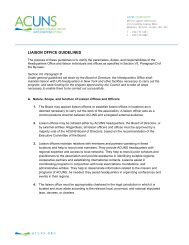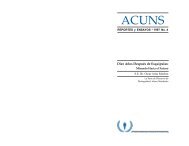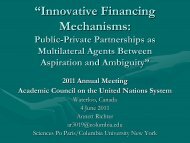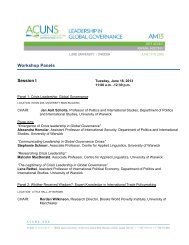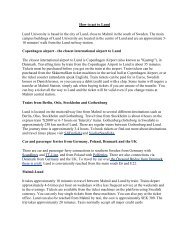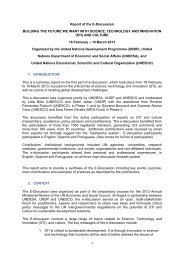THE FUTURE OF NUCLEAR ENERGY TO 2030 AND ITS ... - acuns
THE FUTURE OF NUCLEAR ENERGY TO 2030 AND ITS ... - acuns
THE FUTURE OF NUCLEAR ENERGY TO 2030 AND ITS ... - acuns
Create successful ePaper yourself
Turn your PDF publications into a flip-book with our unique Google optimized e-Paper software.
The Centre for International Governance Innovation<br />
inaugurated in the wake of 9/11, have been useful in<br />
integrating the various activities and in funding them<br />
through a special Nuclear Security Fund (NSF). However,<br />
funding is still insufficient and too many conditions<br />
are attached by donors. The IAEA’s Illicit Trafficking<br />
Database is another useful service, but suffers from<br />
insufficient participation by states.<br />
Finding the Right Balance<br />
between Secrecy and Transparency<br />
Because of the secrecy that surrounds nuclear security<br />
(much of it for understandable reasons), international<br />
transparency is constrained and IAEA involvement less<br />
welcome. The Nuclear Energy Agency recommends a<br />
sensible “need to know” concept with two levels of disclosure:<br />
release of “generic” information on policies and<br />
practices to provide a measure of transparency, while<br />
limiting public release of specific information on facilities,<br />
transportation routes and other technical and operational<br />
details to avoid compromising security. This could<br />
form the basis for rethinking the balance between the<br />
conflicting values of confidentiality and transparency<br />
that may improve global governance instruments in this<br />
field, making peer review, for instance, more feasible.<br />
Fashioning a Universal Nuclear<br />
Security Regime<br />
As in the case of nuclear safety, there needs to be greater<br />
cooperation among the various stakeholders involved in<br />
nuclear security. Industry seems largely content to leave<br />
matters to governments, as it does in the case of nonproliferation<br />
issues. However, a major security incident at a<br />
nuclear power plant would threaten the nuclear revival<br />
in a similar fashion to a major nuclear reactor accident.<br />
In designing new generation reactors, vendors need to<br />
consider security in the same way that they consider<br />
safety, while regulators need to consider how to apply<br />
security regulations to new facilities. New entrants need<br />
to develop security practices and acquire a sustainable<br />
security culture quickly. Cooperation seems axiomatic.<br />
There is a need for a truly international, universal nuclear<br />
security regime that encompasses all interested parties<br />
― international organizations, governments, regulators<br />
and industry. The US/Russia Global Initiative to Combat<br />
Nuclear Terrorism and the World Institute of Nuclear Security<br />
(WINS) are both excellent initiatives that deserve<br />
support from all stakeholders worldwide. Whether they<br />
are the beginnings of such a global regime, or whether it<br />
needs to be constructed afresh, are questions that require<br />
urgent attention.<br />
Select Recommendations<br />
• All states, but especially those seeking nuclear energy<br />
for the first time, should be strongly urged to accede<br />
to the CPPNM and sign and ratify the Amendment<br />
to help bring it into force as soon as possible; a<br />
campaign should be mounted by the IAEA and supportive<br />
states to achieve this.<br />
• The UN Security Council’s 1540 Committee should<br />
adopt objective criteria to identify sectors and countries,<br />
like nuclear security in developing states that<br />
seek nuclear energy, where implementation is a high<br />
priority; it should cooperate more closely with the<br />
IAEA in coordinating assistance to states in this area.<br />
• States should make increased financial contributions<br />
to the regular IAEA budget that funds nuclear security<br />
and to the voluntary Nuclear Security Fund; states’<br />
restrictions on NSF funding should be dropped.<br />
• The April 2010 Nuclear Security Summit should address<br />
the security of the civilian nuclear power sector<br />
and adopt measures specifically targeted at this issue,<br />
including, where appropriate, those outlined above.<br />
• Above all, a true global security community for the<br />
nuclear energy sector needs to be established involving<br />
all stakeholders.<br />
28 cigionline.org



